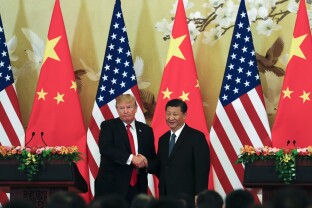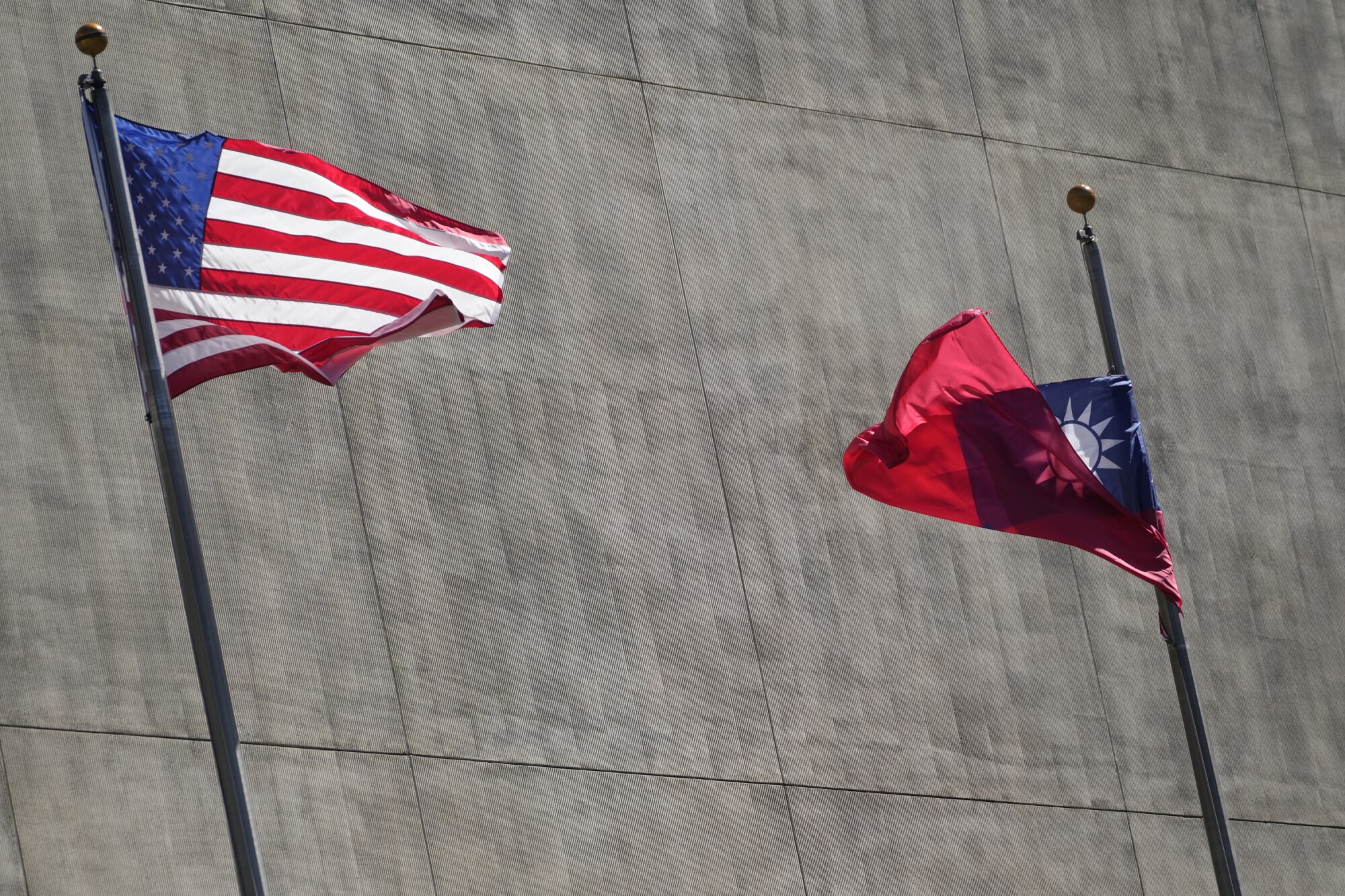Lawmakers are increasingly alarmed by Chinese leader Xi Jinping’s aggression against Taiwan — and by the possibility a war could break out during a second Donald Trump presidency.
They have no idea how Trump — already the de facto GOP presidential nominee — would handle it, and some members from both parties are hoping to prepare now so even Trump’s chaotic, isolationist foreign policy wouldn’t become catastrophic for Taiwan.
Trump is “irrational, he’s unstable, he’s a dangerous human being,” Rep. Jim McGovern, a Massachusetts Democrat and member of the Congressional-Executive Commission on China, told NOTUS.
“He doesn’t seem to have any appreciation for diplomacy,” he continued. “And I worry that, you know, he’s a guy who’s threatened to break up our alliances, and he’s a guy who I think has no appreciation of the potential for conflict with China.”
Trump hasn’t said what he would do if China invaded Taiwan, although Josh Rogin of The Washington Post reported in his 2021 book that he once expressed skepticism about America’s ability to respond: “Taiwan is like two feet from China,” a senator recalled Trump saying, according to Rogin. “We are eight thousand miles away. If they invade, there isn’t a fucking thing we can do about it.”
Trump’s potential handling of a conflict over Taiwan if he wins the White House again “just depends entirely, honestly, on who his foreign policy team is,” said retiring Rep. Mike Gallagher, the Republican who chairs the House select committee on competition with the Chinese government. “Obviously, he said a few things that might suggest he’s not interested in defending Taiwan.”
Last term, Trump’s China policy was often divided between officials who sought a more amicable relationship (with economic benefits like trade deals) and hawkish Republicans who wanted to see a firmer stance toward China. “It wasn’t like a productive team of rivals,” Gallagher said. Instead, it often resulted in “two steps forward, one-and-three-quarter steps back.”
He and other lawmakers hope to head off the issue by acting now to send more military assistance and weaponry to Taiwan and shore up America’s presence in the Indo-Pacific region.
“I think Xi Jinping is serious when he says he wants to invade, and that should drive us to be on a war footing in order to avoid war,” Gallagher said. He visited Taiwan late last month with a bipartisan group of lawmakers, where he discussed regional security with Taiwanese leaders.
Trump’s opposition to aid for Ukraine — along with Democratic disputes over whether to send additional aid to Israel — has stalled a $95 billion national security package passed by the Senate last month. Roughly $10 billion of that funding was aimed at deterring the Chinese government through partnerships in the Indo-Pacific and helping Taiwan defend itself.
Sen. Jeff Merkley, an Oregon Democrat who opposed the bill because it included aid to Israel, said time is limited to get weapons to Taiwan. “It’s incredibly important that we help Taiwan develop its asymmetric ability to protect itself against a Chinese invasion,” he said. “Militarily, it’s very hard to cross a body of water, and particularly a large body of water. So there’s a lot we can do to help them be, if you will, a porcupine state.”
Merkley, who co-chairs the Congressional-Executive Commission on China, declined to speculate on how Trump would handle conflict over Taiwan. “I certainly hope Donald Trump is not going to be our next president,” he said.
Even though they’re at odds over the Senate’s national security package, lawmakers are poised to chip away at the issue this week. A last-minute government funding deal set to become law this week includes billions of dollars for small island nations in the Pacific Ocean, a policy Defense Department officials have said is one of the most urgent tasks for Congress this year. The funding is part of an agreement known as the Compacts of Free Association, which gives the United States exclusive access to the waters surrounding the islands and their airspace. The military views the deal as essential for maintaining the United States’ standing in the region — and deterring aggression by China.
President Joe Biden’s administration has prioritized diplomacy with China to cool tensions, even delaying human rights sanctions as officials tried to secure meetings with Chinese leaders. China recently agreed to reestablish direct military communications with the United States, a goal of Biden’s to prevent escalation and misunderstandings. But Biden has repeatedly said in public that the United States would come to Taiwan’s defense if China invades, only for administration officials to walk back his comments in attempts to preserve a long-standing policy of “strategic ambiguity” intended to deter either side from making drastic moves. (Some lawmakers think it’s an intentional deterrence strategy, calling the perceived disagreement within the Biden administration “ambiguous strategic ambiguity.”)
A problem that’s proven more difficult to address than diplomacy and military assistance: In recent years, weapons supply chain gaps have slowed down the production of munitions Taiwan seeks to purchase. Gallagher said Taiwan should be moved to the top of the administration’s priority list for foreign military sales, a goal even Ohio Republican Sen. J.D. Vance, who thinks America is “overextended” abroad, supports.
“The best way to deter a Chinese invasion of Taiwan is actually to provide them a lot of weapons now to increase the cost of invasion,” Vance, who opposes further Ukraine aid, told NOTUS. “The money I worry less about than the weapons systems, and I think that we have to actually ramp up production of weapons systems so we can support the Taiwanese in the event of a Chinese invasion. But I think Taiwan is much more core to America’s national security interest than Ukraine is.”
Sign up for the latest from NOTUS.
Sen. Mitt Romney, a retiring Utah Republican, argued the issues are the same.
“If we don’t support Ukraine, it’s going to be clear to the people of Taiwan that we won’t support Taiwan when push comes to shove,” he said in an interview last week. “If we don’t support Ukraine, Taiwan is going to fall into Chinese hands.”
If Trump does win back the White House, Gallagher found one bright side to his decision-making process.
“There was such a level of unpredictability, that I do think Xi and [Vladimir] Putin kind of thought, ‘Well, I don’t know. I can’t — I don’t want to test this guy,’” he said. “There was a way in which Trump’s unpredictability at times enhanced deterrence.”
—
Haley Byrd Wilt is a reporter at NOTUS.
Sign in
Log into your free account with your email. Don’t have one?
Check your email for a one-time code.
We sent a 4-digit code to . Enter the pin to confirm your account.
New code will be available in 1:00
Let’s try this again.
We encountered an error with the passcode sent to . Please reenter your email.



